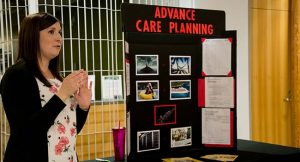Article submitted by Cari Borenko Hoffmann
Have you ever been afraid a medical crisis could leave you too sick to make your own healthcare decisions?
Planning for your future health care needs — a process referred to as Advance Care Planning (ACP) — can help you ensure you receive the medical care you require in the event you are unable to speak for yourself. Having conversations and making an Advance Care Plan can guide health care providers and family members who will be called on to make decisions on your behalf.
At the Gaetz Family Practice in Chilliwack, Advance Care Planning has become part of routine care during complex care visits. Advanced Medical Office Assistant (AMOA), Laura Dencer is currently working with patients and doctors at the clinic to ensure patients have access to the information they need to put an Advance Care Plan in place.
Discovering Advance Care Planning
In 2018, Laura completed the Advanced Medical Office Assistance Certificate program at the University of the Fraser Valley.
The AMOA program was developed in collaboration with the Abbotsford Division of Family Practice to transfer some administrative tasks and operating functions from the physician to an experienced Medical Office Assistant. This helps improve service delivery and frees doctors’ time to focus on care. So far, the program has been offered in Abbotsford, Surrey/Delta, Chilliwack, and soon in Kelowna, B.C.
Throughout the program and following completion, AMOAs are encouraged and supported to take on additional responsibilities within their primary care offices.
When she started her AMOA studies, Laura recalls thinking that Advance Care Planning “wasn’t really a topic of interest.”
However, that changed when Continuing Education instructor Mike Mutter invited Cari Borenko Hoffmann, Fraser Health Advance Care Planning Lead, to speak to the AMOA class about Advance Care Planning.
“The ACP presentation completely drew me in,” Laura says. “There was so much I didn’t know about substitute decision makers. Treatment doesn’t always equal a cure or a full return to function, so deciding on treatments isn’t always a simple yes or no. I realized that if I wasn’t familiar with these intricacies, most patients probably weren’t either.”
This is when Laura decided to make Advance Care Planning the topic of her capstone project.
Helping patients develop Advance Care Plans
Since then, the Gaetz Family Practice’s medical team has supported Laura to implement Advance Care Planning into routine care with patients during complex care visits.
Her process is as follows:
- Laura asks patients to fill out a questionnaire in the waiting room, asking if they wish to discuss end-of-life planning and cardio-pulmonary resuscitation.
- When patients answer yes, she invites them to return in two to four weeks for a follow-up Advance Care Planning visit and provides a handout about what will be discussed, as well as a copy of My Voice (B.C.’s provincial planning guide).
- She encourages patients to bring written information about their temporary substitute decision makers’ names and numbers, as well as their own wishes, beliefs, and values.
“During the follow-up visit, doctors can answer any questions patients may have and make sure their wishes match up with any medical orders on file,” Laura explains. “I find that patients become very engaged. It’s interesting to see how many people have strong ideas about what they want. Without going through this process, we would have had no idea! It has also been very helpful to see patient’s lists of substitute decision makers — we just didn’t always know who our patients’ family members were until now.”
According to Laura, it’s never too early to develop your own Advance Care Plan: she reports that after one of her patients began the Advance Care Planning process in the office, her husband (without any significant health issues) came in, asked for the documentation, and made an appointment to discuss his wishes with the doctor.
“Moving forward” Laura says, “I would like to expand our process so that all patients 65 and over have an Advance Care Plan.”
“The success of Advance Care Planning takes a community as well as many shining stars,” says Cari Borenko Hoffmann, ACP Lead for Fraser Health. “The success at Gaetz Family Practice is the result of partnerships between the Abbotsford Division of Family Practice, University of Fraser Valley, and Fraser Health, as well as Laura, Dr. Harder, and Dr. Lippa — two physicians who not only supported Laura but encourage patients and families to engage in conversations before a health crisis arises.”


